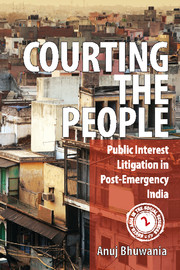Book contents
- Frontmatter
- Contents
- Acknowledgements
- Introduction
- 1 Competing Populisms: Revisiting the Origins of Public Interest Litigation in India
- 2 The Case that Felled a City: A PIL with Nine Lives
- 3 Public Interest Litigation as a Slum Demolition Machine
- 4 Good Judges, Bad Judges: Critical Discourses on Public Interest Litigation in India
- Conclusion: The Procedural is Political
- Bibliography
- Index
Conclusion: The Procedural is Political
Published online by Cambridge University Press: 23 July 2017
- Frontmatter
- Contents
- Acknowledgements
- Introduction
- 1 Competing Populisms: Revisiting the Origins of Public Interest Litigation in India
- 2 The Case that Felled a City: A PIL with Nine Lives
- 3 Public Interest Litigation as a Slum Demolition Machine
- 4 Good Judges, Bad Judges: Critical Discourses on Public Interest Litigation in India
- Conclusion: The Procedural is Political
- Bibliography
- Index
Summary
In Max Weber's classic exposition of modern law in ‘Economy and Society’, he describes the need for a logically formal rational legal system to exist in tandem with the rise of capitalism. This model of modern law is that of a society dominated by an autonomous rule system, or ‘legalism’, as legal sociologist David Trubek calls it. A legalistic society in this sense is of course an ideal type, and so is its Weberian opposite: kadijustiz. As Weber's translator Max Rheinstein explains it, the term kadijustiz was used by Weber as ‘a term of art to describe the administration of justice which is oriented not at fixed rules of a formally rational law but at the ethical, religious, political, or otherwise expediential postulates of a substantively rational law.’
The legal history of post-Emergency India shows a remarkable opposition to legalism and a concomitant embrace of ‘kadijustiz’ at all levels of the judiciary – or, as Dr Rajeev Dhavan has called its Indian analogue, ‘panchayati justice’. Being ‘legalistic’ has decisively emerged as a negative attribute for judicial performance in post-Emergency India. In this book, I have focused on the rise of this culture of legal informalism at the highest levels of the Indian judiciary and its impact, through an examination of PIL. But the institutional impact of such legal informalism is not limited to the PIL jurisdiction alone. It has infected every part of the legal system.
One of the most spectacular instances of ‘panchayati justice’ in recent years, which finally led to some critical debate on this phenomenon, was the verdict given by the Lucknow Bench of the Allahabad High Court in September 2010, in what is perhaps the most controversial legal case in contemporary India: the civil suit to decide the Ram Janmabhoomi–Babri Mosque dispute. The legal dispute was to settle title to the disputed property between three principal parties: the Hindu idol ‘Shri Ram Lalla Virajman’, another Hindu religious organization ‘Nirmohi Akhara’, and the Sunni Central Wakf Board. As a private property dispute filed in a civil court, such a case is governed by strict rules of procedure, and the court can only give forms of relief that are legally prayed for. However, the verdict given, after the suit had been pending for decades, was to divide the property equally among all three parties.
- Type
- Chapter
- Information
- Courting the PeoplePublic Interest Litigation in Post-Emergency India, pp. 134 - 143Publisher: Cambridge University PressPrint publication year: 2016



